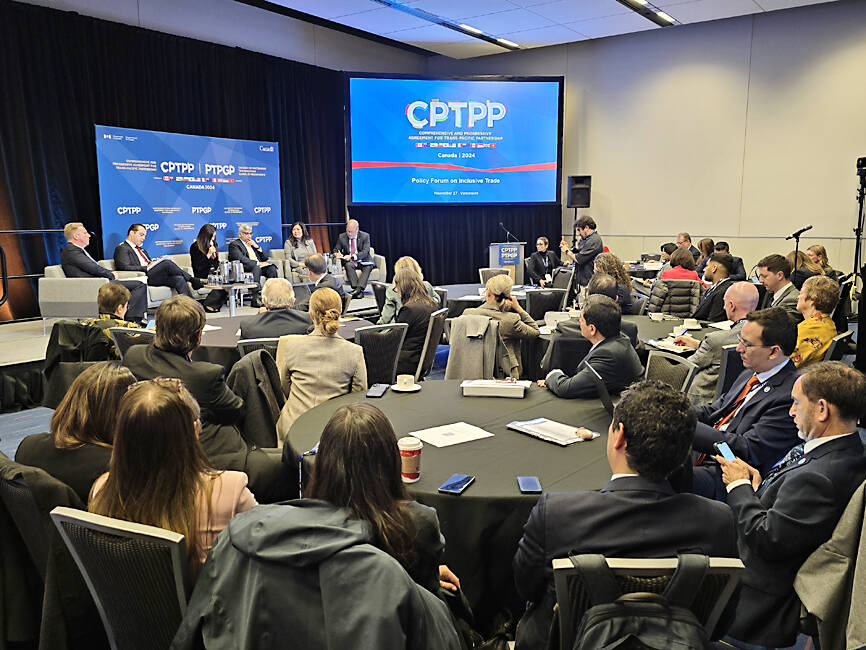Officials yesterday declined to comment on a recent report suggesting that discussions on Taiwan’s membership in a regional trade bloc had been put off.
“At the moment, [we have] no further comment on the matter,” Cabinet spokesperson Michelle Lee (李慧芝) told a news briefing in Taipei.
She was responding to a media question about Politico’s report that members of the Comprehensive and Progressive Agreement for Trans-Pacific Partnership (CPTPP) had decided to put off discussions on the ascensions of Taiwan and China.

Photo: CNA
“We are awaiting a joint statement by the CPTPP,” Lee said, adding that she hoped the situation would be clearer after the bloc’s commission meeting in Vancouver, Canada, yesterday and today.
The Politico report cited sources familiar with the matter as saying that while Taiwan was, along with Costa Rica, one of “the two most prepared applicants” for the trade pact, its ascension “has not garnered consensus among certain members, notably Malaysia and Singapore.”
Taiwan’s bid had been held up “because of the politics with China,” which submitted its own application to the CPTPP in September 2021, less than a week before Taiwan, the report added.
Beijing opposes Taipei’s accession to the CPTPP, which has led officials to worry that a successful bid by China could sink Taiwan’s hopes of joining the bloc.
Lee at yesterday’s briefing said that Taiwan “adheres to the three ‘Auckland Principles’ to meet the high standards of the CPTPP,” referring to the requirements set by the bloc for new memberships.
The Office of Trade Negotiations also declined to comment on the report.
Yang Jen-ni (楊珍妮), the office head and the country’s top trade negotiator at an economic forum in Taipei last month described joining the CPTPP — a regional bloc of 12 member states that represent about 15 percent of the global economy — as “essential for Taiwan.”
“Taiwan’s exclusion from the CPTPP would limit our ability to adapt and enhance our competitiveness,” Yang said, adding that it would also be a “missed opportunity” for the pact’s members, as they would lose out on “Taiwan’s unique strengths” in advanced technologies and other areas.

Taiwan would benefit from more integrated military strategies and deployments if the US and its allies treat the East China Sea, the Taiwan Strait and the South China Sea as a “single theater of operations,” a Taiwanese military expert said yesterday. Shen Ming-shih (沈明室), a researcher at the Institute for National Defense and Security Research, said he made the assessment after two Japanese military experts warned of emerging threats from China based on a drill conducted this month by the Chinese People’s Liberation Army’s (PLA) Eastern Theater Command. Japan Institute for National Fundamentals researcher Maki Nakagawa said the drill differed from the

‘WORSE THAN COMMUNISTS’: President William Lai has cracked down on his political enemies and has attempted to exterminate all opposition forces, the chairman said The legislature would motion for a presidential recall after May 20, Chinese Nationalist Party (KMT) Chairman Eric Chu (朱立倫) said yesterday at a protest themed “against green communists and dictatorship” in Taipei. Taiwan is supposed to be a peaceful homeland where people are united, but President William Lai (賴清德) has been polarizing and tearing apart society since his inauguration, Chu said. Lai must show his commitment to his job, otherwise a referendum could be initiated to recall him, he said. Democracy means the rule of the people, not the rule of the Democratic Progressive Party (DPP), but Lai has failed to fulfill his

A rally held by opposition parties yesterday demonstrates that Taiwan is a democratic country, President William Lai (賴清德) said yesterday, adding that if opposition parties really want to fight dictatorship, they should fight it on Tiananmen Square in Beijing. The Chinese Nationalist Party (KMT) held a protest with the theme “against green communists and dictatorship,” and was joined by the Taiwan People’s Party. Lai said the opposition parties are against what they called the “green communists,” but do not fight against the “Chinese communists,” adding that if they really want to fight dictatorship, they should go to the right place and face

A 79-year-old woman died today after being struck by a train at a level crossing in Taoyuan, police said. The woman, identified by her surname Wang (王), crossed the tracks even though the barriers were down in Jhongli District’s (中壢) Neili (內壢) area, the Taoyuan Branch of the Railway Police Bureau said. Surveillance footage showed that the railway barriers were lowered when Wang entered the crossing, but why she ventured onto the track remains under investigation, the police said. Police said they received a report of an incident at 6:41am involving local train No. 2133 that was heading from Keelung to Chiayi City. Investigators